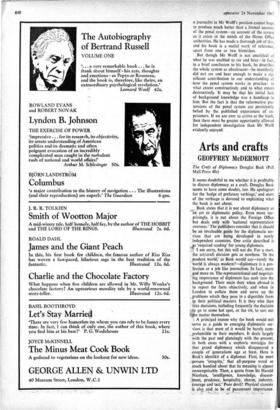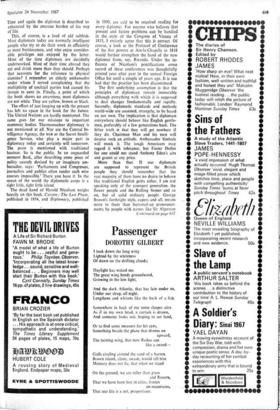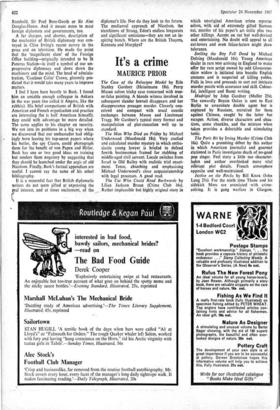Arts and crafts
GEOFFREY McDERMOTT
It seems doubtful to me whether it is profitable to discuss diplomacy as a craft. -Douglas Busk seems to have some doubts, too. He apologises for the 'hedge of prefatory verbiage,' and most of the verbiage is devoted to explaining what the book is not about.
Busk states that it is not about diplomacy as an art or diplomatic policy. Even more sur- prisingly, it is not about the Foreign Office but deals only with 'national representation overseas.' The publishers consider that it should be an invaluable guide for the diplomatic ser- vices that are being developed in newly independent countries. One critic described it _as 'required reading' for young diplomats.
I am sorry, but this will not do. For a start, the art/craft division gets us nowhere. 'In the modern world,' as Busk would say—surely the world is always modern?—diplomacy is a pro- fession or a job like journalism. In fact, more and more so. The representational and negotiat- ing importance of diplomats has sunk into the background. Their main duty when abroad is to report the facts objectively, and when in London to collate them and serve up the problems which they pose in a digestible form to their political masters. It is they who then take decisions, including frequently the decision
.to go to some hot spot, or the UN, to sort out
*pie matter themselves.
■ A principal reason why the book would not serve as a guide to emerging diplomatic ser- vices is that most of it would be barely com- prehensible to their members. It deals largely with the past and glancingly with the present, in both cases with a euphoric nostalgia for that grand diplomacy which disappeared a couple of generations ago at least. Here is Busk's identikit of a diplomat. First, he must possess 'integrity,' that all-purpose word so much bandied about that its meaning is almost unrecognisable. Then, a quote from Sir Harold Nicolson, 'intelligence, knowledge, discern- ment, prudence, hospitality, charm, industry, courage and tact.' Poor devil! Physical stamina is also said to be of paramount importance. Time and again the diplomat is described Is exhausted by the onerous burden of his way of life.
This, of course, is a load of old rubbish. Most diplomats today are normally intelligent people who try to do their work as efficiently as most businessmen, and who enjoy consider- able privileges not enjoyed by the latter. Most of the time diplomats are decidedly underworked. Most of their time abroad they eat and drink more than they should. Perhaps that accounts for the reference to physical stamina? I remember an elderly ambassador under whom I served complaining that the multiplicity of cocktail parties had caused his insteps to cave in. Finally, a point of which the book shows no awareness, most diplomats are not white. They are yellow, brown or black.
The effort of just keeping up with the present has left no space in the book for the future. The United Nations are hardly mentioned. The same goes for our missions to important economic bodies. Thermonuclear diplomacy is not mentioned at all. Nor are the Central In- telligence Agency, the KGB or the Secret Intelli- gence Service, who play a major part in diplomacy today and certainly will tomorrow. The press is mentioned with traditional hauteur. So is the public. In an unguarded moment Busk, after describing some piece of policy suavely devised by an imaginary am- bassador, says: 'Parliaments and Congresses, journalists and publics often render such wise courses impossible.' There you have it. In the ocean of the world the diplomatic corps is a right little, tight little island.
The dead hand of Harold Nicolson weighs heavily on this book. Curzon : The Last Phase, published in 1934, and Diplomacy, published
in 1950, are said to be required reading for every diplomat. For anyone who believes that present and future problems can be handled in the style of the Congress of Vienna of 1815, I entirely agree that this is correct. Of course, a look at the Protocol of Conference of the five powers at Aix-la-Chapelle in 1818 would further strengthen the hand of the new diplomat from, say, Rwanda. Under the in- fluence of Nicolson's pontifications some record of these conferences was thoughtfully printed year after year in the annual Foreign Office list until a couple of years ago. It is too bad that the practice has been discontinued.
The first underlying assumption is that the principles of diplomacy remain immutable although everything with which it is supposed to deal changes fundamentally and rapidly. Secondly, diplomatic standards and methods world-wide are assumed, strangely, to be based on our own. The implication is that diplomats everywhere should behave like English gentle- men, preferably of a few generations back. The bitter truth -is that they will get nowhere if they do. Chairman Mao and his men will despise such an attitude. Ambassador Simbule will mock it. The tough Americans may regard it with tolerance; but Foster Dulles for one could not stand Anthony Eden's airs and graces at any price.
More than that. If our diplomats are supposed to represent the British people they should remember that the vast majority of them have no desire to behave like traditional English gents either. I am not speaking only of the youngest generation, the flower people and the Rolling Stones and so on, but of solid ordinary people. George Brown's forthright style, capers and all, means more to them than buttoned-up pronounce- ments by people with names like Sir Algernon Continued on page 652
Rumbold, Sir Paul Bore-Gooth or Sir Alec Douglas-Home. And it means more to most foreign diplomats and governments, too.
A far sharper, and shorter, description of the mechanics of British diplomacy was con- veyed in Clive Irving's recent survey in the press and on television. He made the point that the 'magnificent slum' of the Foreign Office building—originally intended to be St Pancras Station—is itself a symbol of our un- progressive diplomacy and slows down the machinery and the mind. The head of adminis- tration, 'Cautious Colin' Crowe, gloomily pre- dicted that it would take many years to improve matters.
I feel I have been beastly to Busk. I found him an amiable enough colleague in Ankara in the war years (we called it Angora, like the rabbits). His brief comparisons of British with American and French organisation and practice are interesting (he is half American himself); they could with advantage be more detailed. The same applies to his chapter on security. We ran into its problems in a big way when we discovered that our ambassador had oblig ingly been leaving his top-secret papers where his butler, the spy Cicero, could photograph them for the benefit of von Papen and Hitler. Busk has one or two good ideas on training but renders them nugatory by suggesting that they should be launched under the aegis of old Nicolson. Finally, Busk's factual appendices are useful. I cannot say the same of his select bibliography.
It is a mournful fact that British diplomatic writers do not seem gifted at expressing the real interest, and at times excitement, of the diplomat's life. Nor do they look to the future. The mediaeval approach of Nicolson, the starchiness of Strang, Eden's endless longueurs and significant omissions—they are not an in- spiring bunch. Where are the British Thayers, Kennans and Murphys?
















































 Previous page
Previous page